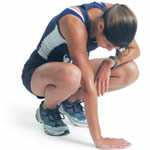How many times a week do you workout? Notice that I said times not days. If you’re doing a class in one part of your day and then running for a period of time or lifting weights during another part of your day then you’re working out more than once in that day. Count these, not the days. How many days a week do you take off?
How do you feel when you wake up the morning after a workout? Are you still tired? Have you become a little more irritable? Are your legs feeling heavy when you’re going for your next run or workout? If any of this sounds familiar you may be suffering from overtraining.
In a very detailed paper published by the School of Physiotherapy at Curtin University, they define over training as – “an imbalance between training/competition versus recovery. Alternatively stated, it is too much training or competition combined with too little time for regeneration.” They list symptoms among others as “waking unrefreshed, loss of competitive drive, injury, muscle soreness and joint pain.”
Butler Universities Adrian Shepard goes a little further and lists other symptoms as
- Decrease in performance
- Increase in resting heart rate and blood pressure
- Increased muscle fatigue, disturbed sleep patterns
- Depression, irritability, apathy and low self-esteem
Dr William Kraus a cardiologist at Duke University who studies exercise adds that “you just feel bad. The spark is gone.”
Dr Steven Keteyian, director of preventative cardiology at Henry Ford Hospital in Detroit says ‘there’s another trap, athletes are obsessed and gullible. They will do anything they can to improve their performance and they don’t know when to stop.”
As many of my clients have heard from me, the real work happens after the training ends. It begins with the recovery process. When the body has a chance to rejuvenate itself and prepare for the next load that is about to be delivered. If your body does not get this time to rest then you will continue to tear it down and it will NOT have a chance to increase its condition, and you can risk injury.
For more Health & Fitness information please visit our ongoing blog at
